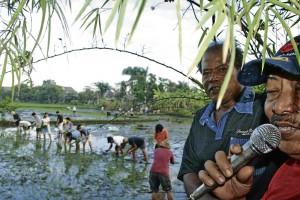In Pampanga, farm musicians are a vanishing breed

THE MAMAGE, a rice-planting musical tradition in Pampanga, lives on with the music of D’Amazing Band. Their songs dictate the pace of planting and ease the backbreaking task. TONETTE T. OREJAS/Inquirer Central Luzon
SANTA RITA, Pampanga—City dwellers planting rice at Alviz Farm here on Sunday got a rare bonus: A vanishing breed of musicians called the “mamage” treated them to a medley of farming songs seldom sung in the province’s rural areas.
Under a bamboo grove, Ricardo Sotto and Victor Galang first belted “Abak a maranun (Early morning),” then segued to a Kapampangan song in the tune of the American country ditty, “Jambalaya on the Bayou,” before ending with “Plasdan (Fishpond)” in their first set at around 7 a.m.
The farm workers planting rice immediately took to the quick tempo, setting a faster work pace, which is the purpose of the mamage.
The visitors, among them retired banker Rolando Rodriguez, were adjusting to the beat set by the singing of Sotto and Galang to the accompaniment of guitarists Alfredo Conwi, 64, and Ben Bondoc, 60. Their quartet is called the “D’ Amazing Band.”
“We sing for weddings, baptisms, mañanita (birthday serenades), tambuli (processions of saints). But in the past decade, it’s rare that we are hired to be mamage,” said Galang, 62, of Barangay (village) Sta. Monica here.
Article continues after this advertisementSotto, 53, said the tradition has been diminishing because many farmers have resorted to direct seeding of palay, a technique that does not need to pace the planters.
Article continues after this advertisementHe said transplanting, where newly grown rice seedlings are transferred from beds to richly irrigated soil, needs the mamage. Farmers bend as they plant, making the task more tiring and slow.
So aside from dictating the pace of farming, the mamage also entertain the farmers, he said. “They don’t feel tired then,” he added.
The mamage used to sing near the farmers. They are equipped with two electric guitars and a mini-sound system fitted into a tricycle. They avoid the sun now to keep their blood pressure in check, they said.
There is no school for the art. Galang learned it from his late brother, Emilio, whose contemporaries have all died. They learned playing the guitar by oido (hearing) and derived the songs from zarzuelas (musical plays) that are rarely mounted these days.
Sotto was trained by his father, Amado, who, at 73, still farms less than a hectare of rice land in Barangay San Nicolas in Floridablanca town. A long-running radio program on dwGV-FM makes him familiar with polosa (extemporaneous songs) by Totoy Bato (Rodolfo Laxamana in real life).
The mamage are usually paid double the rates of farm workers, who usually get a minimum of P270 daily. Businesswoman and cultural advocate Teresita Guanzon gave more than that to make the musicians play, as a birthday gift to Andy Alviz, artistic director of Arti Sta. Rita and whose family owns the farm.
“We are few now because farmers who plant rice have become fewer now,” said Galang.